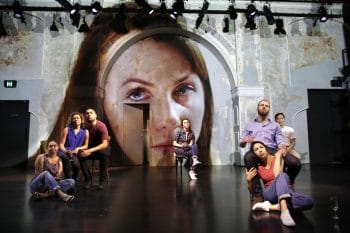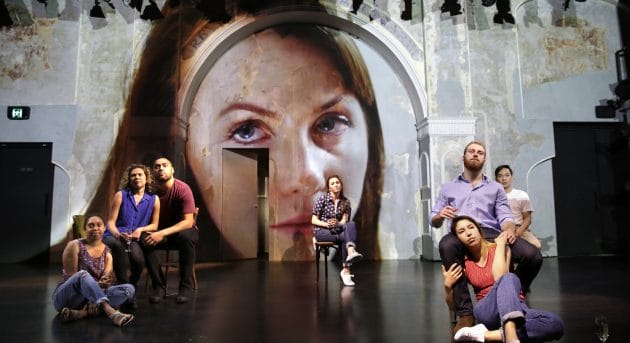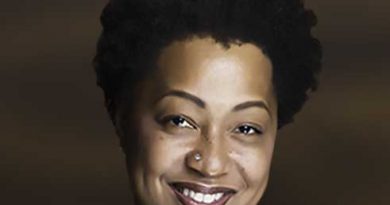A Man with Five Children – Darlinghurst Theatre Co
Nick Enright’s A Man With Five Children is a thoughtful exploration of the beginnings of reality television. Based on the Seven Up! documentary series, his filmmaker Gerry (Jeremy Waters), decides to follow five children with his camera until they turn 21. The thing is, he has trouble letting go – his lives and theirs become uncomfortably intertwined.

Enright’s children are the product of our all-too-brief proud multiculturalist movement of the 1970s, with diverging markers of race and class. Zoe (Jody Kennedy) is shy and working class; Cameron (Taylor Wiese), also working class and with a penchant for sports, has inherited his family’s xenophobia; Jessie (Chenoa Deemal), is an Indigenous Australian raised with to be proud and politically aware; Roger (Jemwel Danao) is a first-generation Australian, his parents are high earners; and Susannah (Charlotte Hazard), who is French and also well-off, is bright and academic, with some parental pressure to stick with the books despite a love for softer, more artistic things.
As the children grow, they must contend with the constant presence of the cameras and a national consciousness that remembers all their youthful embarrassing moments; Zoe and Jessie cringe every time a shared curious, adolescent kiss is replayed on television; Roger must contend with seeming like the posh, materialistic kid, despite his growing disconnect from his inherited lifestyle.
There is not, in this world, yet any gold standard for reality stars in Australia or overseas – they are sort of celebrities, but only sort of – they are known more to others, perhaps, than themselves – and this necessarily influences the trajectories of their lives. Zoe rejects the pressure of rising above the way she is perceived, forging her own defiant path into an adult life; Jessie embraces her activist edit and follows that thread of life for the rest of her life.
This is a tight ensemble – the five children must be convincingly very young and naturally adult onstage and their performances are thoughtful and rarely resembling shtick. They’re joined by their partners over time – played by Ildiko Susany, Anthony Taufa, and a goofy Aaron Tsindos – and they are a warm and welcome addition to the play and the stage. Waters’s Gerry is mercurial, but this also means his performance is difficult to read; a major revelation of feeling seemed to not exist to him before he voiced it – the lack of groundwork turned the revelation into something unbelievable, and the play’s second act suffered for it.

Largely Gerry’s relationship with his children is an unhealthy one and things as a result, over time, grow quite dark; he favours some over others, he intrudes and disrupts their lives in perhaps shattering ways; he becomes (deplorably) sexually involved with one; he uses them to plug the empty parts of his inner life. It’s a fascinating study, a little uneven in tone and structure, but engaging nonetheless.
Anthony Skuse is great at preserving small moments in his shows with large or bustling casts; he brings the human asides, the small touches, the throwaway comment, into sharp relief. He seems to direct this show with so much compassion for its characters, which is admirable, but they seem less nuanced than perhaps they could be – particularly Gerry.
The highlight of the production is the video and projection work (by Tim Hope). Soundbites from the children as they age, their young faces, play on the back walls of the Eternity Playhouse. With sympathetic, personal framing, we are never too far from the characters’ inner thoughts and feelings – we never forget their beginnings. One image in particular becomes something like our conscience as it flickers in and out of life – one character’s life falls apart, and their younger self remains projected there, with all the hope and promise of a life barely begun. It’s haunting.
Darlinghurst Theatre Company has with this play come to the end of their agreement with the Enright Family, staging one Nick Enright play a year for three years. It’s easy to understand the appeal: there is a naturalistic, emotive Australian voice in Enright’s plays, a simplicity that belied his works’ innate sensitivity. Enright wrote to capture a specific national mood and seeing a play like this one, that has gently and naturally become dated, reminds us we lost him too soon. What would he say now about our relationship with the media and reality TV? What would he think of us; what would look like reflected on stage through his eyes?




